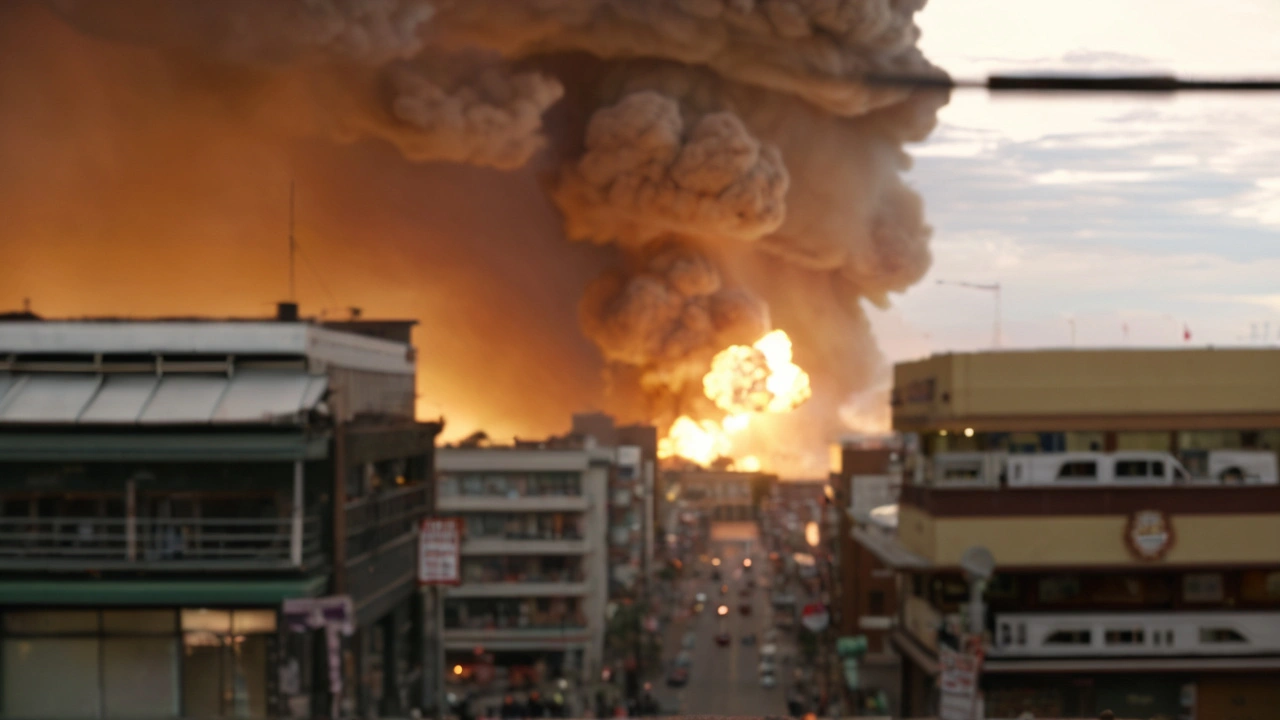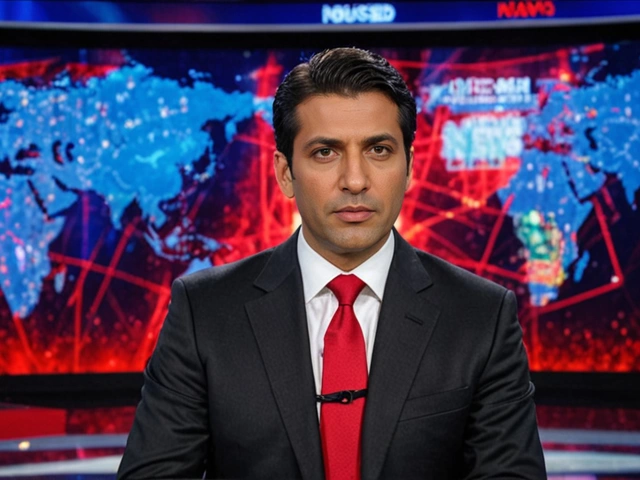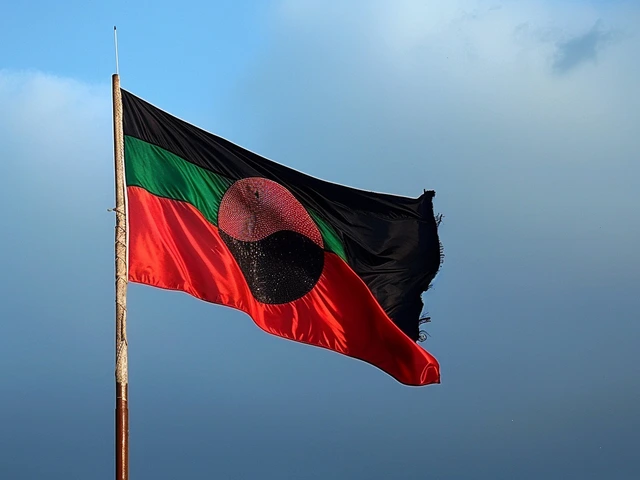Iran Denounces Israeli Airstrike on Yemen's Hodeida Port Amid Escalating Regional Tensions
The geopolitical landscape in the Middle East has once again been thrust into turmoil as Iran condemns Israel's latest military action in Yemen. The Israeli airstrike targeted the port of Hodeida, a significant stronghold of the Houthi rebels, resulting in six deaths and numerous injuries. This military response followed a deadly drone attack by the Iran-backed Houthis on Tel Aviv, which claimed the life of an Israeli civilian.
The Iranian Foreign Ministry, through its spokesperson Nasser Kanani, expressed severe disapproval of what he termed Israel's 'aggressive behavior.' Kanani pointedly accused Israel and its allies, including the United States, of contributing to the 'dangerous and unpredictable consequences' sweeping the region. According to Kanani, these actions only exacerbate the chaos unfolding in Gaza and extend to broader assaults in Yemen.
This recent strike is just one chapter in the complex narrative of the ongoing Israel-Hamas war, which began in October. The conflict shows no sign of abating, drawing Iran-backed militant groups from not just Gaza, but also from Syria, Lebanon, Iraq, and Yemen into its midst. The reverberations of each missile and drone attack seem to ripple out across the entire region, setting off new rounds of violence and retaliation.
The Houthis, an Iran-aligned group entrenched in Yemen's civil war, have threatened what they describe as a 'huge' retaliation against Israel. Such declarations raise the specter of an even more extensive military escalation. With each side ramping up threats and counter-attacks, the question of how much further this cycle of violence can spiral remains pressing.
Yemen: A Proxy Battlefield
The conflict in Yemen is far from a localized issue, acting instead as a proxy battlefield for larger regional powers like Iran and Saudi Arabia. The Hodeida port, in particular, has been a focal point of conflict because of its strategic importance in terms of supply chains and control. The airstrike on this port has ramifications not just militarily but also in terms of humanitarian aid delivery, given that Yemen is already one of the world's most impoverished countries.
Humanitarian organizations have long warned about the devastating impact of blockades and strikes on key Yemeni ports. With millions dependent on international aid, any disruption could worsen the already dire living conditions. The airstrike thus not only has immediate military consequences but could also spawning even greater humanitarian crises.
Domestic Reactions and International Stances
Within Israel, the government maintains that such military actions are necessary for national security, particularly after the deadly drone strike on Tel Aviv. Public sentiment in Israel shows support for decisive action against groups perceived as direct threats. However, the growing conflict attracts international scrutiny and compels nations to navigate a delicate diplomatic balancing act.
The United States, a staunch ally of Israel, finds itself in the middle of an increasingly fragile geopolitical tinderbox. American involvement, primarily through diplomatic channels, seeks to de-escalate tensions, but its unequivocal support for Israel occasionally complicates these efforts. In parallel, Iran uses these conflicts to bolster its standing as a regional power against Israeli and Western interests.
Across Europe and other parts of the world, leaders have raised concerns about the escalating violence but have struggled to effect meaningful intervention. Calls for ceasefires and peace talks often fall on deaf ears, given the entrenched positions of the parties involved. The humanitarian toll continues to rise, even as international bodies like the United Nations attempt to mediate.
The Long Shadow of the Israel-Hamas War
This latest confrontation is another offshoot of the Israel-Hamas war, a conflict that has already deeply affected the region since its onset in October. Iran’s involvement, providing support to groups opposing Israel, exacerbates an already volatile situation. Each new battlefront, whether in Gaza, Syria, Lebanon, or Yemen, adds layers of complexity to an already intricate conflict structure.
Iran’s condemnation of Israel’s strike in Hodeida thus is not merely posturing but part of a larger strategy to consolidate its influence over sympathetic militant groups. This serves to put pressure on Israel and its allies while sending a message of deterrence. For Israel, the strategy revolves around showcasing military strength and maintaining national security through preemptive strikes.
These intertwined conflicts reveal the precarious balance of power in the region. Every strike and counter-strike raises the stakes, drawing more governmental and non-state actors into a widening gyre of conflict. The persistent violence leaves little space for diplomatic solutions, making international peace efforts seem ever more distant.
Humanitarian Concerns and Future Outlook
As military actions intensify, the humanitarian crisis in Yemen and Gaza continues unabated. Airstrikes, blockades, and ongoing battles severely restrict the flow of essential supplies such as food, water, and medical aid. For populations already suffering under dire conditions, the additional strain exacerbates an already untenable situation.
Efforts by international organizations to deliver aid are frequently hampered by the security situation. The international community faces the daunting challenge of addressing these overlapping humanitarian emergencies without exacerbating the very conflicts that necessitate the aid. Human lives hang in a precarious balance as geopolitical maneuvers play out on the grand stage.
The regional tensions thus show no sign of diminishing. As belligerents on all sides continue to engage in acts of violence and retaliation, the prospect of a peaceful resolution appears increasingly distant. Each new development, like the Israeli airstrike on Hodeida or the Houthi drone attack on Tel Aviv, serves to deepen the existing fissures and fuel further instability.
With Iran firmly backing groups opposed to Israel and Israel persisting in its aggressive military tactics, the hope for a return to stability remains bleak. In the face of such entrenched positions, the international community's role in mediating and mitigating conflict becomes ever more critical yet arduous. The unfolding events thus remain subject to the ebb and flow of military, political, and diplomatic currents that define this turbulent region.






12 Comments
Ajay Kumar
July 22, 2024 AT 04:42 AMlook i know everyone's mad at israel but let's be real here. the houthis are just iran's puppets. they've been shooting drones at israel for years, and now they're surprised when israel hits back? this isn't aggression, it's a response. the port? yeah it's bad for aid, but if you're using a humanitarian hub to ship missiles, you're not a victim, you're a target. stop pretending this is about civilians when it's about power. the west doesn't care about yemen, they care about stopping iran from controlling the red sea. and honestly? i'm not sorry.
Chandra Bhushan Maurya
July 24, 2024 AT 02:48 AMoh my god. my heart is literally breaking. six people. six. just six. and we're all sitting here debating strategy like it's a chess game. but these were mothers. sons. grandfathers who just wanted to sell fish. and now their bodies are in rubble while politicians sip coffee and call it 'necessary force'. i can't sleep. i keep seeing their faces. the port isn't just concrete and cranes-it's hope. and someone just crushed it with a bomb. who are we if we don't weep for this?
Hemanth Kumar
July 25, 2024 AT 03:40 AMThe instrumentalization of humanitarian infrastructure as a military asset constitutes a violation of the Geneva Conventions, irrespective of the actor involved. The Houthi movement's utilization of the Hodeida Port for the logistical support of asymmetric warfare operations necessitates a proportional response under the doctrine of anticipatory self-defense, provided such action adheres to the principles of distinction and minimization of collateral damage. The Iranian state's rhetorical condemnation, while politically expedient, fails to address its own complicity in perpetuating this cycle of non-state actor militarization. The international community's inaction is not neutrality; it is complicity through omission.
kunal duggal
July 27, 2024 AT 02:01 AMFrom a systems theory perspective, this is a classic negative feedback loop in a complex adaptive system: kinetic responses to kinetic threats, with no positive feedback mechanisms for de-escalation. The Houthi-Iran nexus functions as a distributed autonomous actor within the regional power grid, while Israel’s preemptive strikes are optimization algorithms for threat reduction. But the system lacks a global controller-no centralized coordination for humanitarian corridors, no shared data layer for deconfliction. Until we engineer a multi-agent peace protocol with real-time aid flow mapping, we're just optimizing for destruction. We need a blockchain-based ceasefire ledger.
Ankush Gawale
July 28, 2024 AT 13:22 PMI get why people are angry. I really do. But what if we stopped seeing this as a war between nations and started seeing it as a war against suffering? Everyone here is scared. Everyone is hurting. Maybe instead of pointing fingers, we could ask: how do we get food to the kids in Hodeida? How do we stop the next drone? Not by bombing more ports, but by talking. Even if it's hard. Even if it feels useless. We have to try.
रमेश कुमार सिंह
July 30, 2024 AT 01:36 AMyou know what i think? this whole thing is like a broken record in a storm. every time someone plays a note, someone else screams louder. the houthis scream, israel bombs, iran yells, america shrugs, and the people? the people are just trying to find a dry corner to sleep in. i don't care who started it. i care that no one's listening. we're all just echoes in a canyon of pain. and if we keep shouting, the canyon will swallow us whole. maybe we need silence. not war. not tweets. silence.
Krishna A
July 31, 2024 AT 18:58 PMthis is all fake. the whole thing. the ‘drone attack on tel aviv’? staged. the ‘six dead’? actors. the port? empty. they're all just trying to scare you into supporting more war. the real story? the military-industrial complex is making billions. and you? you're just a data point in their algorithm. wake up. they want you to hate. they need you to click. this isn't politics. it's a horror movie and you're the audience.
Jaya Savannah
August 1, 2024 AT 19:07 PMso... israel bombs a port full of starving people, iran yells ‘how dare you’, and we all just shrug and go back to scrolling? 🤡 i mean, what’s next? a tweet war? 🤦♀️ someone please tell me this isn’t real life. #sendhelp #notagain
Sandhya Agrawal
August 3, 2024 AT 04:49 AMthey're watching us. all of them. the drones, the satellites, the algorithms. every comment you make, every like, every share-it's feeding the machine. they know you're angry. they know you're scared. and they're using it. don't you see? the more you react, the more fuel you give them. silence is the only weapon left. don't engage. don't reply. don't comment. just... disappear.
Vikas Yadav
August 4, 2024 AT 05:40 AMI think... we, as humans, have forgotten what peace even looks like. We've turned conflict into entertainment, into news cycles, into hashtags. We forget that behind every headline, there's a child who won't eat today. A mother who won't sleep. A father who won't come home. We need to stop treating war like a sport. And start treating human life like... well, like life. Please. Just... please.
Amar Yasser
August 5, 2024 AT 18:36 PMbro this is wild. i just wanna say, maybe we all need to chill for a sec. nobody wins when kids die in ports. nobody. maybe israel shouldn't bomb, maybe houthis shouldn't launch drones, maybe iran shouldn't fund them. but we're all just stuck in this loop. i don't have the answers. but i know we gotta try harder than this.
Steven Gill
August 6, 2024 AT 19:18 PMi think the real tragedy isn't the strike or the drone or even the politicians. it's that we've stopped feeling it. we scroll past six dead, we read about port closures, we sigh, we move on. but what if one of those six was your brother? what if your sister was waiting for food at that port? we're not just watching a war-we're forgetting how to be human. i don't know how to fix it. but i won't look away anymore.